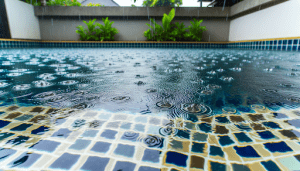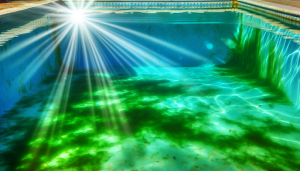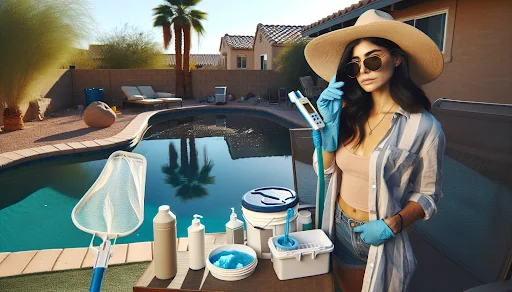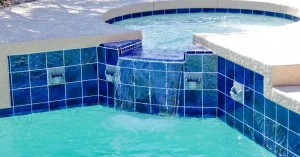Balancing Act: The Impact of Weather on Pool Maintenance: Discuss How Different Weather Conditions Affect Pool Water Balance and Maintenance
A sparkling clean pool is a symbol of relaxation, enjoyment, and exercise. But have you ever wondered about the impact of weather on pool maintenance? Discuss how different weather conditions affect pool water balance and maintenance, as understanding this impact is essential to keep your pool in pristine condition, ensuring a safe and enjoyable swimming experience.
This comprehensive guide will explore the impact of weather on pool maintenance, discuss how various weather conditions influence pool water balance and maintenance, provide essential tips for year-round upkeep, and introduce Silverline Pools, your reliable partner in pool maintenance. Let’s dive into the world of pool water chemistry and weather!
- Weather plays a major role in pool maintenance and water balance.
- Regular testing, chemical levels adjustment, debris removal and proactive steps are essential for optimal upkeep during different weather conditions.
- Silverline Pools provides comprehensive services with high customer satisfaction rating.
Weather’s Influence on Pool Water Balance and Maintenance
The maintenance and water balance of your swimming pool are significantly influenced by weather. Factors such as temperature, humidity, and rainfall impact the chemical balance and cleanliness of your pool, making consistent upkeep necessary for a safe and pleasant swim.
Upcoming sections detail the impacts of rain, sunshine, and cold temperatures on the water balance and maintenance of a pool, along with important maintenance tips and guidelines for a healthy swimming environment.
Rain and Its Effects on Pool Water
 Rain can be both a blessing and a curse for pool owners. While it may provide a refreshing break from the heat, it can also introduce impurities, alter pH levels, and dilute sanitizer levels in your pool water. Rainwater often carries algae spores and other debris that can decrease the active chlorine level in your pool, creating a conducive environment for algae growth and affecting water quality.
Rain can be both a blessing and a curse for pool owners. While it may provide a refreshing break from the heat, it can also introduce impurities, alter pH levels, and dilute sanitizer levels in your pool water. Rainwater often carries algae spores and other debris that can decrease the active chlorine level in your pool, creating a conducive environment for algae growth and affecting water quality.
To mitigate the issues caused by rain, regular testing of your pool water and adjustment of chemical levels is necessary. Maintaining a clean and safe swimming environment, even during a downpour, is achievable by ensuring the algae elimination rate surpasses their growth.
Sunshine and Its Impact on Pool Chemistry
 Sunshine may be perfect for a day at the pool, but its effects on pool chemistry can be challenging. Sunlight can cause faster chlorine breakdown, leading to increased algae growth and necessitating more frequent chemical treatments. Warmer water temperatures also contribute to the rapid proliferation of algae, demanding extra attention to pool maintenance.
Sunshine may be perfect for a day at the pool, but its effects on pool chemistry can be challenging. Sunlight can cause faster chlorine breakdown, leading to increased algae growth and necessitating more frequent chemical treatments. Warmer water temperatures also contribute to the rapid proliferation of algae, demanding extra attention to pool maintenance.
To mitigate sunshine impacts, you can:
- Monitor and maintain appropriate water levels
- Adjust the chemical concentrations
- Use a pool cover to mitigate evaporation and maintain the pool water’s chemical balance
By following these steps, you can ensure a pleasant swim even on the sunniest days.
Cold Weather Challenges for Pool Owners
Cold weather presents its own set of challenges for pool owners. Winterizing the pool, protecting equipment, and managing calcium levels become crucial tasks during the colder months. Ensuring a proper water balance during winter can prevent potential damage to your pool’s floor and equipment.
Proactive actions like draining the pool to the correct level, adding winter chemicals, and properly insulating pool equipment can help you navigate cold weather challenges, ensuring your pool remains safe and ready for use when the temperature warms up.
Adapting Pool Maintenance to Different Weather Conditions
Adapting pool maintenance, including the use of a pool heater and a pool pump, to various weather conditions ensures optimal pool water quality and safety for an enjoyable experience in swimming pools. Each weather condition, from hot and dry to wet and humid, presents unique challenges that demand careful attention.
The upcoming sections will detail specific maintenance practices for different weather conditions, preparing you for any weather events that may affect your pool.
Hot and Dry Weather Maintenance
Hot weather can be both enjoyable and demanding for pool owners. Here are some important steps to take during scorching summer months:
- Monitor water levels regularly to prevent them from dropping too low due to evaporation.
- Check chemical concentrations frequently to ensure they are balanced and within the recommended range.
- Take measures to prevent algae growth, such as using algaecide and regularly brushing the pool walls and floor.
- Consider using a pool cover when the pool is not in use to reduce evaporation and maintain water levels. By following these steps, you can keep your pool in optimal condition during hot and dry weather.
To keep a balanced and clean pool during hot and dry weather, regular checks of water levels and adjustments to chemical levels are needed. A pool cover can help maintain your pool water’s chemical balance and significantly reduce evaporation.
Wet and Humid Weather Maintenance
Wet and humid weather can be quite challenging for pool maintenance. Regular water testing, chemical adjustments, and debris removal become essential tasks during periods of heavy rainfall and high humidity. Frequent testing and adjusting of pool water chemistry, such as pH and chlorine levels, can help maintain an optimal water balance, ensuring a safe and enjoyable swim.
To mitigate the impacts of wet and humid weather, weekly pool water testing and chemical level adjustments are recommended. Regular debris removal and maintaining a clean pool environment contribute to a pleasant swimming experience, even under challenging weather conditions.
Cold and Freezing Weather Maintenance
Cold and freezing weather requires a different approach to pool maintenance. Winterizing the pool, protecting equipment, and managing calcium levels become essential tasks during the colder months. Ensuring a proper water balance during winter can prevent potential damage to your pool’s floor and equipment.
Proactive actions like draining the pool to the correct level, adding winter chemicals, and properly insulating pool equipment can help you navigate cold weather challenges, ensuring your pool remains safe and ready for use when the temperature warms up.
Essential Tips for Year-Round Pool Maintenance
No matter the weather, year-round pool maintenance is crucial for maintaining a clean and safe swimming environment. Regular water testing, proper filtration and circulation, and protecting pool equipment are all essential aspects of effective pool upkeep.
The upcoming sections provide tips and guidelines for year-round pool maintenance, including pool floor care, ensuring your pool remains a source of relaxation and enjoyment in any weather condition.
Regular Water Testing
Regular water testing is the cornerstone of maintaining optimal water quality in your pool. By detecting imbalances and adjusting chemical levels accordingly, you can ensure a safe and enjoyable swim for everyone. It is recommended to test your pool water at least once a week and adjust the chemical levels as needed to maintain a balanced range.
Monitoring pH and chlorine levels is essential, with the ideal pH range between 7.0 and 8.0, and chlorine levels maintained between 1 and 3 parts per million (ppm). By adhering to these guidelines, you can keep your pool water crystal clear and inviting, no matter the weather conditions.
Proper Filtration and Circulation
Proper filtration and circulation play a vital role in maintaining water clarity in your pool. By removing suspended particles like dirt, leaves, and debris, your filtration system helps preserve the chemical balance of your pool water, reducing the need for extensive chemical treatments.
To ensure proper filtration and circulation, it is essential to:
- Clean skimmer and pump baskets regularly
- Maintain your filter according to the manufacturer’s instructions
- Run your pump daily to guarantee maximum water circulation
By following these essential tips, you can prevent debris buildup and maintain crystal-clear water in your pool.
Protecting Pool Equipment
Protecting your pool equipment from weather-related damage is crucial for ensuring optimal performance and longevity. Storms, high humidity, and heavy rainfall can all pose threats to your pool equipment, making regular inspections and preventative measures necessary.
To safeguard your equipment during different weather conditions, consider the following:
- Use a tarp or cover to shield it from direct sunlight and dust
- Cover the pump motor with a plastic bag or waterproof material to prevent water damage
- Use a freeze guard or digital timeclock to protect your equipment from freezing temperatures and potential damage.
Silverline Pools: Your Partner in Pool Maintenance
For pool maintenance, a reliable partner can significantly improve the process. Silverline Pools offer comprehensive pool maintenance services, including:
- Regular cleaning and vacuuming
- Water testing and balancing
- Equipment inspection and repair
- Filter cleaning and replacement
- Chemical treatment and algae control
With a 4.8 out of 5 Google rating score, Silverline Pools promises complete customer satisfaction.
With over 100 pools installed and reconstructed, Silverline Pools specializes in:
- Pool construction
- Pool maintenance and repairs
- Pool equipment repairs
- Swimming pool cleaning
- Hot tub and spa installations
Trust Silverline Pools to keep your pool in pristine condition, no matter the weather.
Silverline Pools Services
Silverline Pools offers a broad spectrum of services to meet your pool maintenance needs. From pool installation and repair to routine pool cleaning and equipment repairs, Silverline Pools promises high-quality service and a professional approach.
Beyond their pool maintenance expertise, Silverline Pools also provide emergency pool repair services, ensuring your pool stays in perfect condition, even with unexpected issues. With Silverline Pools, you can rest assured that your pool is well cared for.
Customer Satisfaction and Testimonials
Silverline Pools takes pride in their commitment to customer satisfaction. With a 4.8 out of 5 Google rating score, their superior quality of service and customizable pool designs have earned them rave reviews from satisfied customers.
Customers have commended Silverline Pools for their attention to detail, prompt service, and excellent communication throughout the pool construction and maintenance process. Trust Silverline Pools to exceed your expectations and keep your pool in top shape all year round.
Summary
In conclusion, understanding the impact of weather on pool water balance and maintenance is crucial for maintaining a clean and safe swimming environment. By adapting your maintenance practices to different weather conditions and following essential tips for year-round pool upkeep, you can ensure a delightful swimming experience for everyone.
Let Silverline Pools be your partner in pool maintenance, providing comprehensive services and expertise to keep your pool in pristine condition, no matter the weather. Enjoy peace of mind and crystal-clear waters, all year round.
Frequently Asked Questions
What factors contribute to water balance in pools?
The water balance in pools is largely affected by pH, total alkalinity, calcium hardness, temperature and Total Dissolved Solids (TDS). This combination of factors must be kept within a certain range in order to ensure that the sanitizer functions effectively and the pool remains safe and healthy.
How does weather affect swimming?
Swimming in water that’s too cold can lead to increased heart rate and blood pressure, while swimming in temperatures above 82 degrees Fahrenheit can be unpleasant and cause overheating. Air temperature should also be taken into consideration when deciding whether to swim or not.
What happens to pool water level when it rains?
Rainfall can cause pool water levels to rise slightly, but it can also impact the pH balance and alkalinity levels in your pool due to acidic properties in the rainwater. Additionally, contaminants such as fertilizers, debris, and organic matter can make their way into the pool, so running the filtration and pump system for at least 24 hours after periods of significant rainfall is essential.
How does rain affect pool water quality?
Rain can significantly impact pool water quality, introducing impurities and affecting pH and sanitizer levels. Regular testing and chemical adjustments are necessary to maintain safe swimming conditions.
How often should I test my pool water?
It is recommended to test your pool water at least once a week and adjust the chemical levels accordingly for optimal pool maintenance.



